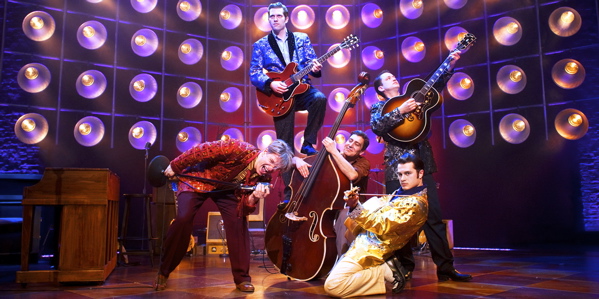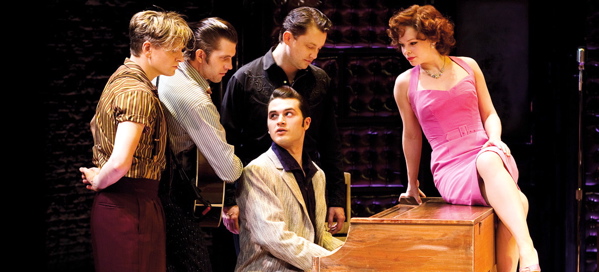
Ben Goddard, Robert Britton Lyons, Derek Hagen, Michael Malarkey as the ‘MIllion Dollar Quartet’, Gez Gerrard on bass
By Ray Bennett
LONDON – “Million Dollar Quartet” is a straightforward jukebox musical but since the music comes from Elvis Presley, Johnny Cash, Carl Perkins and Jerry Lee Lewis at Sun Records in the 1950s, it’s not your average jukebox.
Like “Sunday in the Park with George”, the stage show is based on a single image and like the Stephen Sondheim classic, it attempts to flesh out how the picture came about. That’s where the comparison ends as it’s not so much a musical as a concert.
In this case, it’s the famous photo of the four singers at a piano in Sam Phillips’ Memphis recording studio and the book by Colin Escott and Floyd Mutrux reveals something about what was going on in those heady days of rock ’n’ roll in its infancy, but not a whole lot.
There is, however, a whole lotta shakin’ goin’ on as 23 numbers from that time are given full measure by director Eric Schaeffer, who has brought his creative team from Broadway. The show is as slick as Elvis’ hair.
American Robert Britton Lyons, who originated the role of Carl Perkins on Broadway and has appeared in every production since, joins an otherwise British cast. He has more of the strut and presence of an early rock star than the others although Derek Hagen as Cash, Ben Goddard as Lewis, and Michael Malarkey are all terrific performers.
Malarkey more resembles Joaquin Phoenix as Johnny Cash in the movie “Walk the Line” than Elvis. He’s a little too compact for the legendary performer although he does catch Presley’s sneer in the right light and his baritone is strong if not an echo of the original in numbers such as “That’s All Right, Mama,” “Peace In the Valley” and “Hound Dog.”
Hagen looks less like Cash than John C. Reilly playing Dewey Cox but he has Cash’s way with a rhythm guitar and his rich, deep voice is a match for the man in black on songs including “Sixteen Tons,” “I Walk the Line” and “Riders In the Sky.”
Goddard is a little chunky for the skinny Lewis but he has his blond locks and powerful vocal delivery. He probably is a more versatile pianist than Lewis but he pounds out “Real Wild Child,” “Great Balls of Fire” and “Whole Lotta Shakin’” with tremendous verve.
It’s Lyons, however, who parades the real stuff of rockabilly. Like Perkins, he’s lean with slicked back hair and he has a mean way with a lead guitar. He conveys the bitterness that Perkins had over Presley winning all the glory for his song “Blue Suede Shoes,” which he performs to kick off the show, but also has the charm of a man whose compositions such as “Matchbox” and “Honey Don’t” became staples for later rock bands. The latter was not in the earlier productions but has been added to the West End show. The program makes a point of thanking Paul McCartney, who now owns the song.
Francesca Jackson is a welcome feminine presence as a girlfriend of Elvis and she demonstrates genuine flare on “Fever” and “I Hear You Knocking.” Gez Gerrard on double bass and Adam Riley on drums remain onstage the whole time and give the music the correct propulsion.
Lewis and Perkins trade insults throughout the show, which makes a break for Bill Ward as Sam Phillips, who tells what story there is of the four artists and Sun Records before they went on to fame and riches and he just got fabulously wealthy from radio stations and Holiday Inn stock.
The evening ends with the boys in gleaming jackets as the audience rises irresistibly to the beat of some mightily impressive and infectious rockabilly.
Venue: Noel Cowerd Theatre, London (running through Oct. 27); Cast: Robert Britton Lyons, Derek Hagen, Ben Goddard, Michael Malarkey, Bill Ward, Francesca Jackson; Book, Original concept and direction: Floyd Mutrux; Book: Colin Escott; Director: Eric Schaeffer; Musical arrangements and supervision: Chuck Mead; Set designer: Derek McLane; Costume designer: Jane Greenwood; Lighting designer: Howell Binkley; Sound designer: Kai Harada
This review appeared in The Hollywood Reporter.

